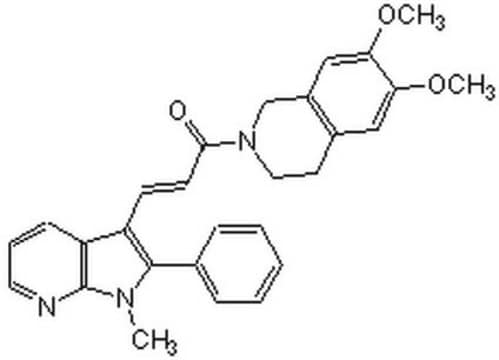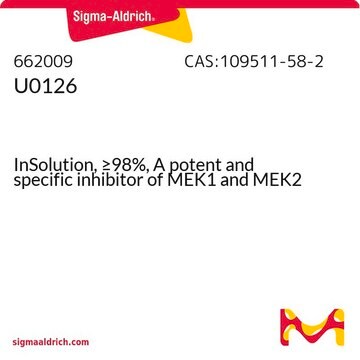S0447
SIS3
≥98% (HPLC), powder
Synonym(s):
(2E)-1-(6,7-Dimethoxy-3,4-dihydro-1H-isoquinolin-2-yl)-3-(1-methyl-2-phenyl-1H-pyrrolo[2,3-b]pyridin-3-yl)-propenone hydrochloride
About This Item
Recommended Products
Quality Level
Assay
≥98% (HPLC)
form
powder
color
yellow
solubility
H2O: <2 mg/mL
DMSO: >20 mg/mL
storage temp.
2-8°C
SMILES string
Cl.COc1cc2CCN(Cc2cc1OC)C(=O)\C=C\c3c(-c4ccccc4)n(C)c5ncccc35
InChI
1S/C28H27N3O3.ClH/c1-30-27(19-8-5-4-6-9-19)22(23-10-7-14-29-28(23)30)11-12-26(32)31-15-13-20-16-24(33-2)25(34-3)17-21(20)18-31;/h4-12,14,16-17H,13,15,18H2,1-3H3;1H/b12-11+;
InChI key
CDKIEBFIMCSCBB-CALJPSDSSA-N
Application
Biochem/physiol Actions
Storage Class Code
11 - Combustible Solids
WGK
WGK 3
Flash Point(F)
Not applicable
Flash Point(C)
Not applicable
Personal Protective Equipment
Certificates of Analysis (COA)
Search for Certificates of Analysis (COA) by entering the products Lot/Batch Number. Lot and Batch Numbers can be found on a product’s label following the words ‘Lot’ or ‘Batch’.
Already Own This Product?
Find documentation for the products that you have recently purchased in the Document Library.
Customers Also Viewed
Our team of scientists has experience in all areas of research including Life Science, Material Science, Chemical Synthesis, Chromatography, Analytical and many others.
Contact Technical Service









